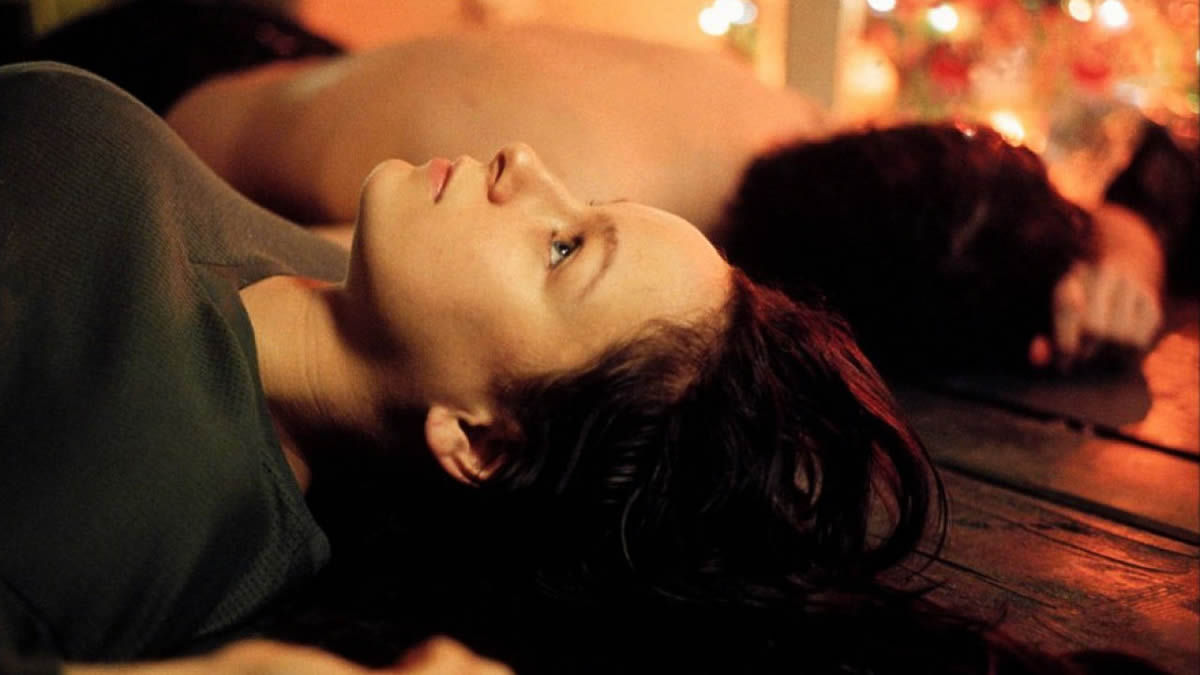There’s an oft cited but frequently debunked statistic that claims the rates of death by suicide greatly increase during the holiday season. Despite mental health charities calling out the fraudulent and potentially dangerous nature of this claim, we hear about it every year. It sticks in our imagination, because on some level it just feels like it would be real. As much as Christmas is a time for comfort, family, and good cheer, it can also be a deeply isolating period. It makes too much sense to us that the holiday would incite such an upsetting trend, almost unsurprising.
The eponymous Morvern Callar, the protagonist of Lynne Ramsay’s 2002 psychological drama, seems attuned to this. The film opens with Morvern waking up on Christmas morning to discover that her boyfriend has died by suicide. His body is lying face down by their Christmas tree, with lights that flash on and off to illuminate his unmoving frame. Morvern lies next to him, taking in the shocking sight, and then seems to go about her day. She opens the presents left under the tree, listens to the impressively compiled mixtape he made for her, then gets on with life. The season continues, even if life doesn’t.
Lynne Ramsay, perhaps Scotland’s greatest working filmmaker, remains one of the true geniuses in her depictions of trauma. We Need to Talk About Kevin shows a guilt-stricken mother pouring over her past and present to figure out the connective tissue between her parenting and her son’s brutal crimes. You Were Never Really Here follows a former soldier who extracts trafficked children from brothels in-between bouts of casual suicidal ideation punctuated by flashes of childhood and military-related PTSD. The young boy front and center in her debut Ratcatcher tries to survive poverty, family, and his own culpability in a horrendous accident. All four of her feature film protagonists are unwitting participants in this pain, witnesses to horror in ways they did not ask for yet must deal with the fallout regardless. Some resort to acts of numbing violence while others try to find answers.
Morvern, played with startling nuance by Samantha Morton, does neither. Her trauma is buried deep beneath a seemingly nonplussed exterior. She is silent for large swaths of the film, often to the irritation of others. The idea of emotions seems strange to her at times. Ramsay makes great use of Morton’s striking face, showing the curiosity of her circumstances in Morvern’s glances at the world around her. She gently strokes her dead boyfriend’s shirtless back, barely paying attention to his slit wrists. It’s not so much that she doesn’t acknowledge reality. Rather, she, and Ramsay’s camera, utterly refuse to sentimentalize what’s happening. Morvern’s trauma is her own, and she has no desire to burden anyone else with it, especially during the happiest of seasons.
Her most shocking act upon her partner’s death is to disregard his final wishes. In his suicide note, he has asked for a funeral (and left behind money for expenses) and that Morvern send his manuscript to publishers. Instead, she methodically chops up his body, tells her best friend that he’s run off and dumped her, then puts her own name on the manuscript. With the money, she travels to Spain, a place of sensory overload that feels incredibly alive in comparison to the small port town in Scotland where she resides and works in a neon-lit supermarket. Still, it’s not necessarily a haven for Morvern or her troubles. She still seems lost, mostly unmoved by this locale. When she tries to convince her friend to move to the country with her, she refuses, saying morbidly that everywhere else is just as bad as home.
Via her boyfriend’s death, Morvern becomes a genius writer through his words; a publisher offers her a major advance for the book that bears her name. This moment of identity theft is further evidence of Morvern’s refusal to define herself by death. Rather than be the poor widow of a tormented genius, she is now the brilliant one. There’s no pleasure in this moment or even the expected guilt. Money and clout can provide her with escape from her small-town struggles, but not the trauma she witnessed there.
The inescapability of trauma permeates Ramsay’s work. Her characters don’t “get better” or find ways to cope with what has happened to them. Brief respites from reality are increasingly fleeting or quickly followed by further reminders of their pain. The Christmas tree in Morvern’s house flashes on and off, a constant beat of light then dark that mirrors her new normal. There’s no way to outrun the agony someone else has inflicted upon her against her will, and not even increasingly questionable acts of denial can erase such hurt. It’s a brutal conclusion, one that Ramsay turns into something more melancholic through Morvern’s embracing of sensations: the feel of her late boyfriend’s cold body; the throbbing lights of a Spanish nightclub; the mixtape of abrasive rock and electro that becomes the soundtrack to her daily life. Despite her best efforts, she never stops feeling. In Morton’s silence, we see a woman close to shattering under this pressure.
Will Morvern ever move on in a healthy way? It is up for debate. Even the darkest of Ramsay’s stories have glimmers of hope in them, albeit with many strings attached. Christmas often promises a fresh start for us, a chance to end the year on a high note and clean the slate for the next twelve months. Morvern Callar seems unlikely to receive such respite. Like the lights on her Christmas tree, her emotions will flicker indefinitely.
“Morvern Callar” is available to stream on Kanopy, RokuTV, and IMDbTV.
